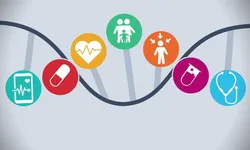
Precision Medicine 
This course provides an overview of precision medicine, including its opportunities and challenges, diagnostics, treatment selection, genetic counseling, public health interventions, biomedical research, data science, and ethical considerations. Participants will gain the key knowledge and tools to understand the fundamentals of precision medicine. ▼
ADVERTISEMENT
Course Feature
![]() Cost:
Cost:
Free
![]() Provider:
Provider:
Coursera
![]() Certificate:
Certificate:
Paid Certification
![]() Language:
Language:
English
![]() Start Date:
Start Date:
8th May, 2023
Course Overview
❗The content presented here is sourced directly from Coursera platform. For comprehensive course details, including enrollment information, simply click on the 'Go to class' link on our website.
Updated in [March 06th, 2023]
Aspect 1: Understanding the Fundamentals and Practical Implications of Precision Medicine. This course will provide learners with the key knowledge and tools to understand the fundamentals and practical implications of precision medicine, its opportunities and challenges. It will address precision-medicine era diagnostics, treatment selection, genetic counseling, public health interventions, and biomedical research.
Aspect 2: Exploring the Multiple Domains of Genetics and Genomics. Experts from the multiple domains of genetics and genomics, oncology, pharmacology, data sciences, ethics, and biomedical research will provide learners with a comprehensive, multi-faceted overview of precision medicine, richly illustrated with practical examples and clinical case studies.
Aspect 3: Applying Precision Medicine to Real-World Scenarios. This course will explain the concepts, offer insights and present concrete examples, thus providing learners with an overall understanding of the rapidly evolving field of precision medicine. Topics such as “genethics”, the analysis of exome sequencing, precision diabetes management, hereditary cancers, the ongoing revolution of genetic technologies, genome-exposome interactions, the pharmacogenetics of opioids, data deidentification, blockchain-base patient-consent documentation, or proteomics and biomarkers will be discussed.
Aspect 4: Learning from Learners' Feedback. The contents of this course have been updated and important corrections have been implemented thanks to learners' feedback. This provides learners with the assurance that the course is constantly being improved and updated to ensure that they are receiving the best possible learning experience.
[Applications]
Upon completion of this course, learners will have the knowledge and tools to apply precision medicine in their respective fields. They will be able to understand the fundamentals and practical implications of precision medicine, its opportunities and challenges, and be able to address precision-medicine era diagnostics, treatment selection, genetic counseling, public health interventions, and biomedical research. They will also be able to apply data science and ethical considerations to their work.
[Career Paths]
Job Position Paths:
1. Precision Medicine Data Scientist: Precision medicine data scientists are responsible for analyzing and interpreting large datasets to identify patterns and trends that can be used to inform precision medicine decisions. They must have a strong understanding of data science principles and techniques, as well as a deep knowledge of the field of precision medicine. Developing trends in this field include the use of artificial intelligence and machine learning to automate data analysis and the use of blockchain technology to securely store and share data.
2. Precision Medicine Clinical Researcher: Precision medicine clinical researchers are responsible for conducting clinical trials and research studies to evaluate the efficacy and safety of precision medicine treatments. They must have a strong understanding of clinical research principles and techniques, as well as a deep knowledge of the field of precision medicine. Developing trends in this field include the use of big data analytics to identify potential treatments and the use of virtual clinical trials to reduce costs and increase efficiency.
3. Precision Medicine Regulatory Affairs Specialist: Precision medicine regulatory affairs specialists are responsible for ensuring that precision medicine treatments comply with applicable laws and regulations. They must have a strong understanding of regulatory principles and techniques, as well as a deep knowledge of the field of precision medicine. Developing trends in this field include the use of artificial intelligence to automate regulatory compliance and the use of blockchain technology to securely store and share regulatory data.
4. Precision Medicine Bioinformatician: Precision medicine bioinformaticians are responsible for analyzing and interpreting genomic and other biological data to identify patterns and trends that can be used to inform precision medicine decisions. They must have a strong understanding of bioinformatics principles and techniques, as well as a deep knowledge of the field of precision medicine. Developing trends in this field include the use of artificial intelligence and machine learning to automate data analysis and the use of blockchain technology to securely store and share data.
[Education Paths]
Recommended Degree Paths:
1. Master of Science in Precision Medicine: This degree program provides students with the knowledge and skills to understand the fundamentals and practical implications of precision medicine, its opportunities and challenges. It covers topics such as genomic analysis, genetic counseling, cancer biomarkers, risk assessment of chronic diseases, gene-environment interactions, pharmacogenomics, multi-omics data integration, data science, and ethical issues. This degree program is ideal for students with a bachelor-level training in life sciences who are interested in pursuing a career in precision medicine.
2. Master of Science in Genomics and Bioinformatics: This degree program provides students with the knowledge and skills to understand the fundamentals of genomics and bioinformatics. It covers topics such as genomics, bioinformatics, data analysis, data mining, machine learning, and computational biology. This degree program is ideal for students with a bachelor-level training in life sciences who are interested in pursuing a career in genomics and bioinformatics.
3. Master of Science in Data Science: This degree program provides students with the knowledge and skills to understand the fundamentals of data science. It covers topics such as data analysis, data mining, machine learning, artificial intelligence, and predictive analytics. This degree program is ideal for students with a bachelor-level training in life sciences who are interested in pursuing a career in data science.
4. Master of Science in Biomedical Informatics: This degree program provides students with the knowledge and skills to understand the fundamentals of biomedical informatics. It covers topics such as medical informatics, health informatics, clinical informatics, and public health informatics. This degree program is ideal for students with a bachelor-level training in life sciences who are interested in pursuing a career in biomedical informatics.
Developing Trends:
1. Precision Medicine: The field of precision medicine is rapidly evolving, with new technologies and data sources being developed and integrated into clinical practice. This is leading to an increased demand for professionals with expertise in precision medicine, such as genetic counselors, data scientists, and biomedical researchers.
2. Genomics and Bioinformatics: The field of genomics and bioinformatics is rapidly evolving, with new technologies and data sources being developed and integrated into clinical practice. This is leading to an increased demand for professionals with expertise in genomics and bioinformatics, such as data scientists, bioinformaticians, and computational biologists.
3. Data Science: The field of data science is rapidly evolving, with new technologies and data sources being developed and integrated into clinical practice. This is leading to an increased demand for professionals with expertise in data science, such as data analysts, data engineers, and machine learning engineers.
4. Biomedical Informatics: The field of biomedical informatics is rapidly evolving, with new technologies and data sources being developed and integrated into clinical practice. This is leading to an increased demand for professionals with expertise in biomedical informatics, such as medical informaticians, health informaticians, and public health informaticians.
Pros & Cons

Indepth course

Gained knowledge

Effective online education

Broadens horizons

Thorough overview

Ethical, legal, and social ramifications discussed.

Evaluation system

Intense genetics concepts

Poor English spoken

Linguistically challenging quizzes.
Course Provider

Provider Coursera's Stats at AZClass
Precision Medicine provides an overview of precision medicine including its opportunities and challenges, diagnosis, treatment options, genetic counseling, public health interventions, biomedical research, data science, and ethical considerations. This course will provide learners with the key knowledge and tools to understand the fundamentals and practical implications of precision medicine, as well as its opportunities and challenges. It will address diagnosis, treatment selection, genetic counseling, public health intervention and biomedical research in the era of precision medicine. This course will explain concepts, provide insights, and provide concrete examples, giving learners a comprehensive understanding of the rapidly evolving field of precision medicine.
Discussion and Reviews
0.0 (Based on 0 reviews)
Explore Similar Online Courses

Typography: Color Contrast and Scale

Android Programming Course - Kotlin Jetpack Compose UI Graph Data Structures & Algorithms

Python for Informatics: Exploring Information

Social Network Analysis

Introduction to Systematic Review and Meta-Analysis

The Analytics Edge

DCO042 - Python For Informatics

Causal Diagrams: Draw Your Assumptions Before Your Conclusions

Whole genome sequencing of bacterial genomes - tools and applications

Birth of a drug

Pharmacology


Start your review of Precision Medicine